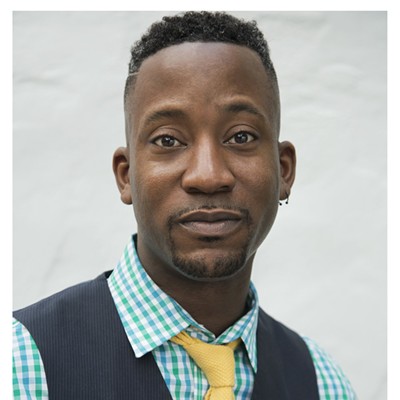By day Patrick Holt is an associate professor at the UA's School of Theatre, Film and Television, and by night he's popular Tucson drag queen Tempest DuJour.
Facebook has helped the teacher-entertainer define his two worlds—a regular page for Holt, UA associate professor of costume and make-up design, husband and the father of two young children; and a different page for DuJour, that saucy and gaudy host of Retro Game Show Night at Hotel Congress the past three years.
But like hundreds of other drag queens across the country, that division that allows Holt to publicize his drag queen persona for the special events DuJour does, from Retro to working it as MC for Tucson Pride, is starting to get a bit fuzzy thanks to a new Facebook policy the social media company is starting to enforce.
Perhaps channeling a bit of DuJour, Holt told the Weekly he can't help but wonder if "some overpaid little asshole at Facebook," came up with the idea.
The policy now requires that everyone with a regular page use their real names in order to "keep our community safe," according to Facebook. "Pretending to be anything or anyone isn't allowed." Drag queens and others using aliases are starting to see the policy go into effect by being locked out of their accounts.
That has yet to happen to Holt. His DuJour page, with more than 1,500 friends, remains in place, but just in case, he's started an entertainer page that allows fans to like DuJour. Gradually Holt's been getting the word out about the change and the new page is now at around 300 likes.
And Holt isn't alone in wondering what Facebook was thinking, especially when it comes to entertainers like drag queens. A Change.org online petition now has more than 30,000 signatures.
"Although our names might not be our 'legal' birth names, they are still an integral part of our identities, both personally and to our communities. These are the names we are known by and call each other and ourselves," the petition states.
"We build our networks, community, and audience under the names we have chosen, and forcing us to switch our names after years of operating under them has caused nothing but confusion and pain by preventing us from presenting our profiles under the names we have built them up with. People we have known (or who have known us) for years are unable to find us, communicate with us, or recognize us in our Facebook interactions now."
There's also other reasons that Facebook should consider allowing certain communities anonymity, according to the petition—victims of abuse, transgender people and "queer people who are not able to be safely 'out.'"
Holt said it feels like the policy, while it may not be intentional, is making it easy to pick on drag queens.
"It's very easy with this policy to pick on the drag queen," Holt said. "It's obvious we use aliases. There's really no other way. It feels like they are going after drag queens and drag queens feel kind of picked on right now."
It's not just drag queens, however, that Holt worries about, too. He does wonder if the company's tenacious approach in keeping the policy is also damaging to those in the transgender community, specifically those in the early stages of transitioning. "Someone may be getting away from calling themselves John Smith and want to be called Stephanie Jones, but because it may not be legal yet, now they will be forced to change their identity online."
On safety, Holt said he agrees with the spirit of the law—safety and bullying prevention—but there needs to be some room for communities who depend on the need for an alias. "When you look at a drag queen profile it's obvious. We're not trying to hide or fool people into thinking we are literally female."
Abby Jensen, transgender activist and member of the Southern Arizona Gender Alliance advisory council, couldn't agree with Holt more. Jensen told the Weekly that the first thing she thought of when she heard about the Facebook policy was Google+. The company had the same policy when it first started, so many people didn't use the social media platform. The company got rid of the policy last year and is allowing anyone to identify however they choose.
"So it is kind of ironic that Facebook suddenly starts to come down on people, and it does seem targeted right now at drag queens," she said, adding that in part it seems economic, because forcing this large group of entertainers to get fan pages may also force them to buy advertising in an effort to reach more people, because if they don't "nobody will see what you do" like they do with personal pages.
And while the drag community seems most affected right now, Jensen said there's no doubt those who are transgender could be harmed, too. Those first transitioning often use online personas to first experience their transgender identities as a way to practice and understand how it feels in this new gender.
"That was certainly true for me," Jensen said. "Even if they know this is where they want to go, but haven't come out to parents or employees (an online identity) can help someone come out by managing the timing and flow of information. It makes a huge difference in how you are accepted."
Using an alternative persona on Facebook can also help someone who is transitioning first engage the trans community, learn and get advice without family and employers finding out. Then, Jensen adds, there is the issue of physical safety, especially for trans women of color, who are disproportionately high risk of being victims of violence.
Jensen said the transgender community also has a high unemployment rate. If someone is forced to use what may be their legal name while transitioning, it can create bias on the job or while job searching.
However, Facebook has said the policy change is all about safety. Jensen, an attorney, counters that there must be another way to address harassment or bullying, such as a reporting mechanism that forces a perpetrator to verify their identity.
The way they are enforcing the policy, she said, is also "highly discriminatory."
They are never going to ask about someone's real name unless it is unusual. Some trans people, Jensen said, choose names suggesting their transgender identity. Facebook could be at risk for violating state laws because this ends up only targeting a few people.
In San Francisco, where Facebook is headquartered and where CEO Mark Zuckerberg resides, popular drag queens took their fight to city hall, even forcing company representatives to meet with them as well as a member of the San Francisco board of supervisors. To no avail—Facebook released a statement that it wasn't changing its mind.
"As of two days ago, they are still unwilling to change their position," Holt said. "It's disappointing."
Holt hasn't received notice from Facebook that it's locking DuJour's page unless he changes it to his real name, but he said the drag community is readying itself for Facebook to start enforcing the policy in full in the next few weeks, as well as other people who use aliases.
The entertainer fan page, while slow in picking up followers compared to DuJour's regular page, is a precaution. Holt said he doesn't want to lose all the pictures he's put up over the years.
"On that page, I'm not using my real name and I'm listing myself as an entertainer, which should be sufficient, but I don't know. It seems so unnecessary," he said.
"Shouldn't Facebook go after real problems, instead of guys in wigs trying to make a buck and make people happy? Seems mean to me."
For more information on the issue and to sign the online petition, visit www.change.org/p/facebook-allow-performers-to-use-their-stage-names-on-their-facebook-accounts.












